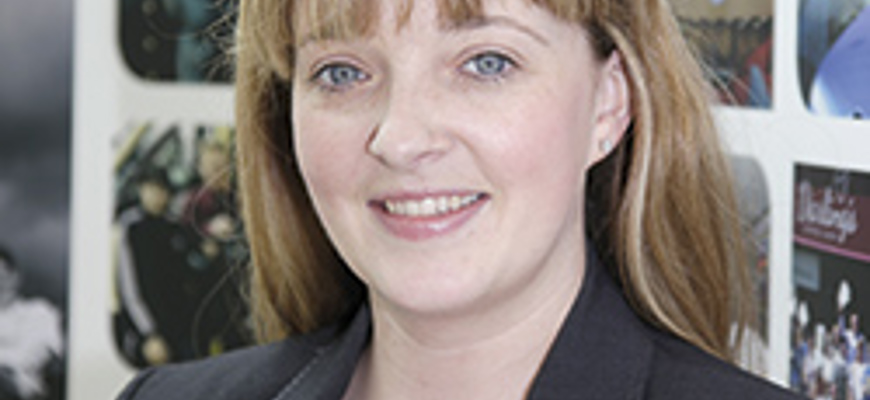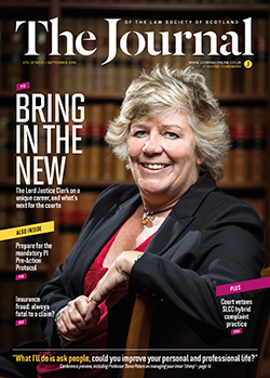Cause of action

Where do you come from, and what was the career path to your current position?
I’m from Lanarkshire and went to the University of Strathclyde, spending a year in Rouen, France, as part of its ERASMUS programme. I gained a joint honours in law and modern languages before studying for the Diploma at the Glasgow Graduate School of Law. I joined MacRoberts for my traineeship, where I had seats in private client, IT/IP, real estate and corporate. After qualifying I was retained as an assistant for two years working on wills, trusts, executries and residential conveyancing, before joining ENABLE in January 2012 – and it was my work with trusts that was the hook into ENABLE Scotland. I have recently been appointed as an external trustee at University of Strathclyde Students’ Association, which I am really excited about.
How is your in-house legal team structured?
We have a number of different charitable companies. ENABLE Scotland is our campaigning, member-led charity. Through our charitable work we lobby Government to make positive changes for people with learning disabilities. We’ve done a lot of work around the Carers Bill to have emergency planning included in it. Our policy team has also had a lot of success around its HUBS campaign – Help Us Be Spontaneous – which removed the need for people with disabilities to give 48 hours’ notice before using public transport. People can now use transport on two to three hours’ notice, a commitment given by Abellio when they won the tender to run Scottish trains. These have been great pieces of work.
Our service provision arm, ENABLE Scotland (Leading the Way), provides support services to more than 2,000 people in 28 local authority areas. Finally, we have ENABLE Trustee Service, a discretionary trust management company looking after more than £10 million in trust for people who have learning disabilities. This is a very unique service. My initial role was working with those trusts. From there my role turned into the sole in-house solicitor and I’m now head of legal and governance and group company secretary. I report to our chief executive.
Overall, we have around 1,600 employees and over 5,000 members, along with a network of 41 local branches from Orkney to Dumfries and everywhere in between. These branches are arm’s-length charities but are affiliated with us so that they can use the ENABLE Scotland brand and network. I lead a team of seven. We cover all legal issues and also manage a portfolio of data protection, health and safety, facilities, building management and the operation of ENABLE Trustee Service.
What is a typical working day?
A lot of what we do, particularly since we provide direct services through ENABLE Scotland (Leading the Way), is very reactive, as we are in people’s homes providing services 24/7. There are though some set events in our legal calendar, such as the start of the financial year which is “contracts season” – when contracting local authorities issue new contracts, or amendments for review. We also have regular governance cycles for each of our boards and subcommittees to meet.
What motivates you on a Monday morning?
This is a really rewarding job, particularly working with ENABLE Trustee Services as there are tangible results. As a solicitor in private practice you don’t always see the direct effect of your actions, but I get to see that every day.
We talk about the “ENABLE family” and you really do feel a part of it. We are working for a cause and everything you do has a direct impact on the people we support – and that’s a good reason to get up and go to work.
What was the biggest change for you when you moved in-house? And what do you really enjoy about working in-house?
It was a bit of a shock to the system – I was two years qualified when I moved. Although ENABLE Scotland has had in-house lawyers before, I only had a brief three-month crossover with someone finishing on maternity leave before I was on my own.
I found the biggest difference from private practice is the need for flexibility, to be open to whatever lands on your desk and to just pick it up and go with it. This variety of work together with the commercial exposure you gain from understanding how all the different parts of the organisation work are what I most enjoy.
Has your organisation experienced any major change recently?
We continue to grow and develop. Two years ago we had our 60th anniversary. We have been campaigning for and on behalf of people who have learning disabilities for 60 years – and for the last 30 years we’ve also been a service provider. The way we do that evolves all the time. Recently, we completed a property consolidation moving out of Glasgow city centre to Eurocentral, and closing satellite offices. We are a nationwide organisation and want to be accessible to the rest of the country.
What is your most unusual/amusing work experience?
A few years ago we hired someone for a temporary position. We needed help and I was delighted when they turned up on their first day. Their first words to me were: “I’m a great believer in bringing a gift and I thought should I bring flowers, wine or chocolates? But I thought those gifts would be inappropriate for the office so, instead, I’ve brought you Ovaltine” – and they handed me a jar! It was a very nice thought but I must confess that it was wasted on me as I don’t drink tea or coffee.
What makes a good in-house lawyer? And what’s your career advice for young lawyers who want to start an in-house career?
I think a good in-house lawyer needs to be flexible, open to challenges, open to change and diversity and must be able to work quickly under pressure. One of the most important parts of the job is being able to strip out jargon and legalese and to give people a straightforward answer to a question.
Many in-house roles are not recruited in the traditional ways, and are often not advertised in the “usual” places. For young lawyers looking to move, if there is an organisation or a company where you would like to work, then approach them. Make the move happen for yourself.
What do you look for when you seek external legal advice from solicitors or counsel?
This is a very diverse and unique organisation. We are a service provider and a campaigning charity, comprised in a charitable group structure, so we need people who understand us. We are also a very values-based organisation with a long history, so we need good legal advice which helps us to achieve our outcomes in a way which fits in with our values.
What are the current hot legal topics in your sector? And how does the future look for in-house lawyers?
There is the fallout from Brexit: we receive European funding for our employability work where we help young people move from school into the workplace. With a large workforce we also face employment legislation-related issues. While the Scottish Government has announced £250 million additional funding to help third-sector organisations meet the living wage from 1 October, we need to meet that challenge with our partners and local authorities. We also have changes to social care registrations for frontline staff. The Scottish Social Services Council has changed its requirements for the qualifications needed to deliver care, so it will be a huge challenge for us to make sure we are ready for all staff to be registered. The vast majority of our staff – more than 1,200 – work on the front line, so we are working towards that aim.
In general, the future looks bright. There are not many in-house lawyers working for charities, and in the social care sector I’m very much a lone voice, but in the next five years I think there will be a lot more chances for people to do a job like mine. I already know of at least one other charity that is looking to set up a legal team.
How do you see the current remit of the In-house Lawyers’ Committee developing?
I think the committee working to highlight the different roles, sectors and organisations in which in-house solicitors work, through interviews like this, is fantastic. I think people would be surprised to see that a
care-provider, third-sector organisation has an in-house team.
How did taking part in the Rising Star Award [achieving runner-up in 2013] help your career?
I thought it was brilliant. At the time, the publicity around it through the website, the Journal and emails helped me make connections with people I would never have had any reason to cross paths with, and who I’m still in touch with today.
What keeps you busy outside the office?
I am househunting at the moment so that takes up a bit of time. I’m also co-owner of an allotment in Uddingston. It’s my first harvest and it’s tremendous fun, although there’s an incredible amount of food to use up.
What would you take with you to a desert island? What would you put in Room 101?
I would take factor 50 sun cream, a good book and Bear Grylls to get me home once I’ve finished it. As for Room 101, I would put in bad manners, bad grammar and bad driving.
In this issue
- Beyond the named person service
- Sexual harassment: an everyday problem
- Governing Scotland in a federal United Kingdom
- Losing our judgment? (1)
- Reading for pleasure
- Opinion: Alison Reid
- Book reviews
- Profile
- President's column
- The future, step by step
- People on the move
- Changing face of the courts
- Success: the chimp factor
- Courts reform: a call to pre-action
- Teeth that could be sharper
- Good claims, bad lies
- Unlocking doors: demystifying squatting
- Back to basics
- Brexit and IP: what should solicitors be doing now?
- Agency, insolvency and termination
- Brexit and the agricultural sector
- A carnival for some, but not for others
- Scottish Solicitors' Discipline Tribunal
- Culling of the hybrids
- Common property: what policy?
- Cause of action
- Client balances: reminder issued
- Law reform roundup
- From the Brussels office
- Paralegal pointers
- Your Law Society of Scotland Council Members
- At the doors of the court
- Ask Ash
- To the focused, the medals
- Losing our judgment?
- MacKenzie boosts Society's AML drive






